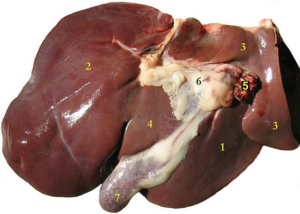Is Your Liver Fat?
Response by Dr. Michael Wald to the question: “I have high blood fats and an elevated liver enzyme. My doctor says that I have fatty liver. Should I be worried?”

Picture of a normal liver – in fatty liver “fatty streaks” take the place of normal liver cells within the liver.
If you do not drink much or at all then the type of fatty liver you have is called nonalcoholic steatohepatisis (NASH). Although this form of liver problem is not considered a disease per se, overtime liver cirrhosis can develop and other complications. There is an association of fat in the liver and cardiovascular disease and your lab finding show that you may be heading down this direction. An overall improvement in your lifestyle and diet should be undertaken and several nutritional compounds have been studied to help reduce fatty liver (they are found within my supplement suggestions below.
Here are my general dietary and lifestyle suggestions that I start my patients off with, but I individualize them based on lots more testing.
Healthy Diet Basics
- 1. Increase the amount of whole, unprocessed foods in your diet (fresh fruit, vegetables, whole grains, beans, raw nuts and seeds) relative to the amount of processed foods you consume (pasta, bread, packaged foods).
2. Diversify our diet by including new and different foods in your diet each week. Rotate the foods you eat so that you don’t consume a given food every day.
3. A fat free diet is not healthy. Fat should constitute 20-30% of our total diet. Limit saturated fats (fats found in animal products) to less than 10% of your total diet. Avoid fried foods, hydrogenated or partially hydrogenated oils and cottonseed oil. Healthy oils to consume: Unsaturated essential omega-3, 6 and 9 fatty acids found in flaxseed oil, olive oil, canola oil, salmon, cod, tuna, mackerel, currants, raw nuts and seeds, avocado and oats: Store oils and nuts/seeds in the refrigerator
4. Eat a high fiber diet by consuming a lot of vegetables, fruits, whole grains, beans, nuts and seeds and minimizing your intake of eats and refined foods.
5. Ensure you eat sufficient protein each day (about 15-20% of your diet). Good protein sources include lean meats, poultry, fish, eggs, soy products, and beans, low-fat dairy products, nuts and food-combining of grains/beans/vegetables.
6. Decrease or eliminate refined and processed sugars from your diet. As a substitute, use natural, unprocessed sugars high in vitamins and minerals needed to help digest them, including 100% pure maple syrup, fruit-only jams, fresh fruit, honey, molasses, barley malt, brown rice syrup and carob.
7. Drink plenty of water each day (body weight divided by 2, multiplied by 0.8 is the number of ounces your body needs, more if you are exercising). Avoid caffeinated and carbonated beverages which are diuretics causing your bod to lose fluid. Herbal teas, fresh vegetable and fruit juices are healthy to consume. Diluted bottled juices and naturally decaffeinated beverages are OK in moderation.
8. Eat several small meals throughout the day instead of two or three large meals. This helps to balance your blood sugar and energy levels throughout the day.
9. Chew your food thoroughly.
10. Don’t drink fluids with our meal.
11. Don’t eat when you are stressed or “on-the-run”.
12. Supplement a healthy diet with a good quality multi-vitamin/mineral complex and other nutrients indicated for our individual health needs.
Nutritional Supplement Considerations
ALL ARE AVAILABLE AT: WWW.BLOODDETECTIVE.COM Along with product descriptions. - Alpha Lipoic Acid 100
- Aminos Complete
- Active Folate
- B12 Super Sublingual
- Blood Sugar Balance
- CardioComplex
- Carnitine 500
- Fiber: Soluble Insoluble Complex
- Krill Complete
- Longevity Complete
- Milk Thistle
- N-Acetyl Cysteine
- Reds Protect
- Reduced Glutathione
- Ubiquinol 50
- Vitamin E Complex
Nutritional components contained in the products above have been studied for either or the reduction of cardiovascular risk, to improve insulin sensitivity and to help reduce fatty liver.
I hope that this information was helpful.
Dr. Michael Wald
 Previous Post
Previous Post